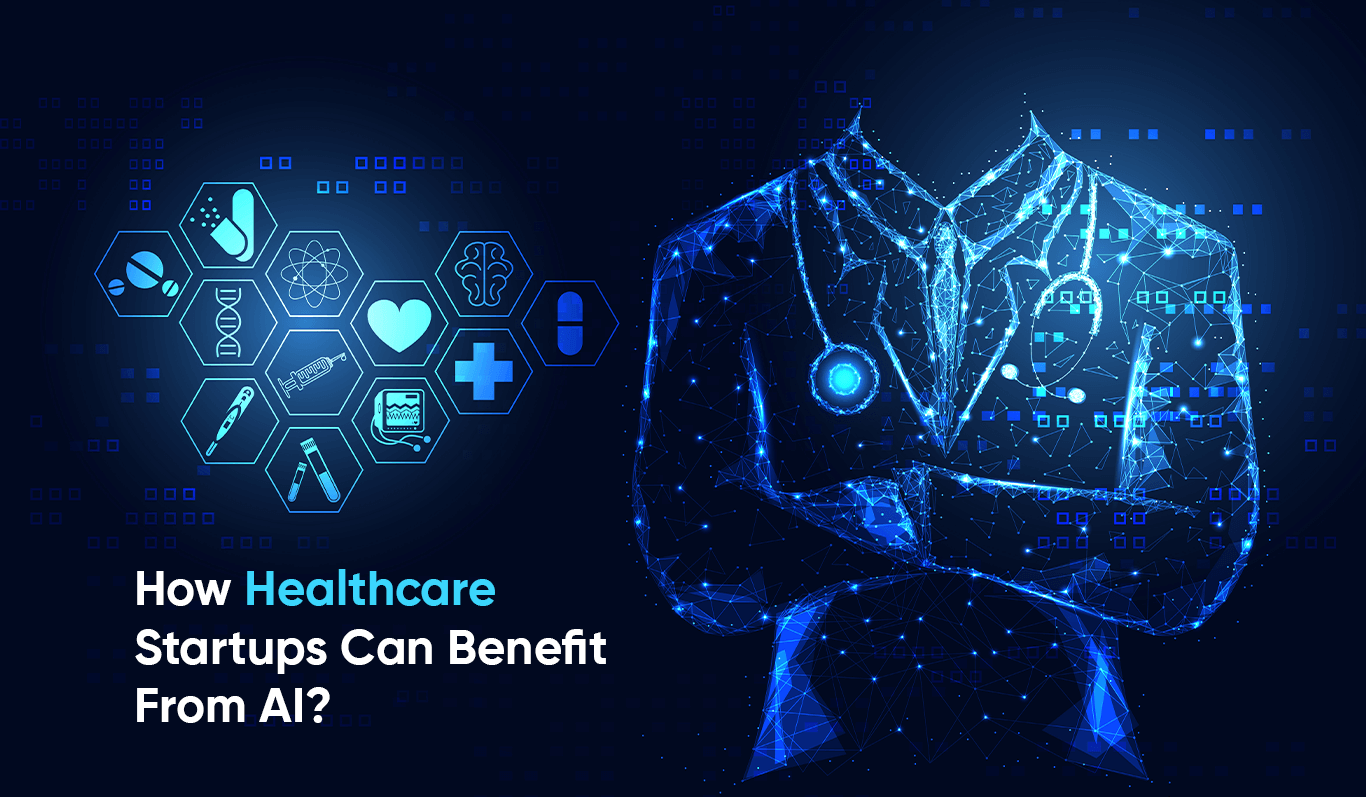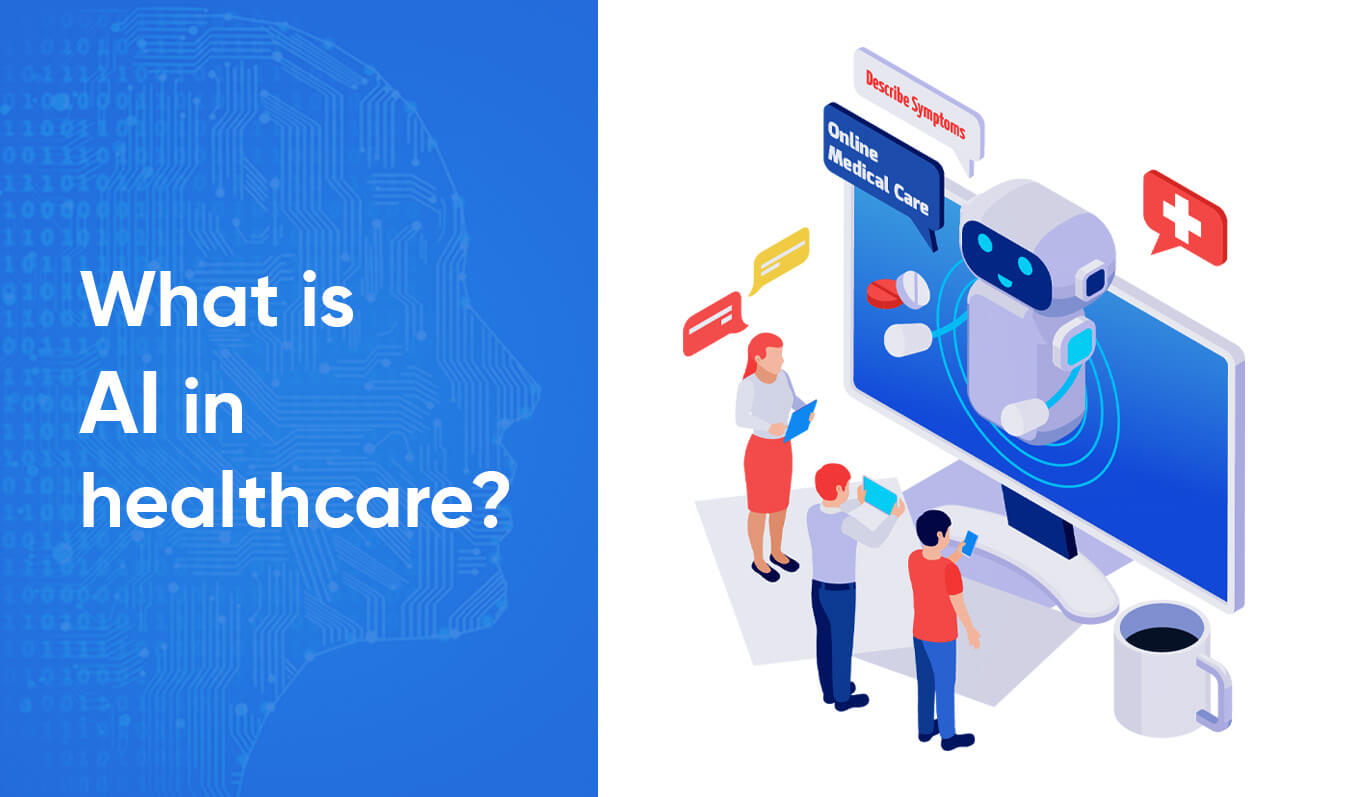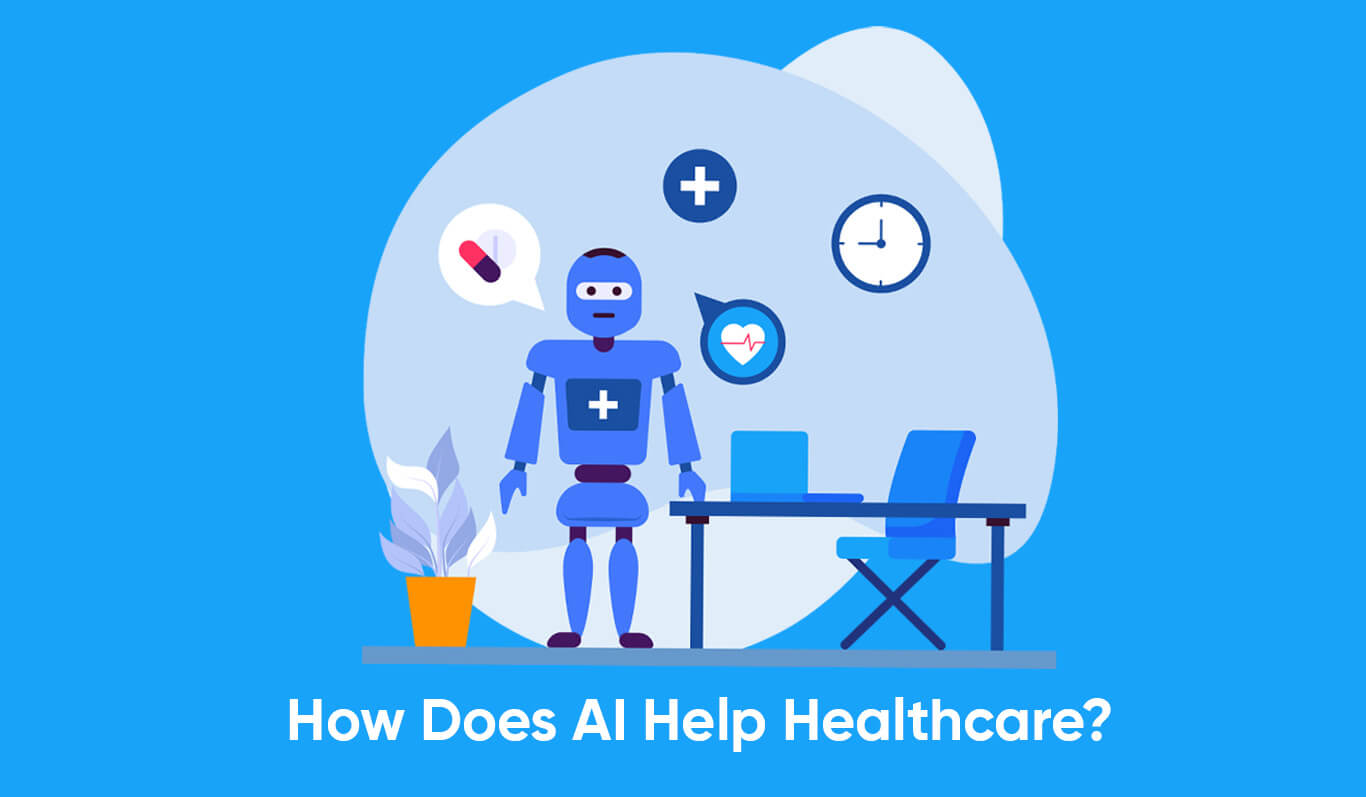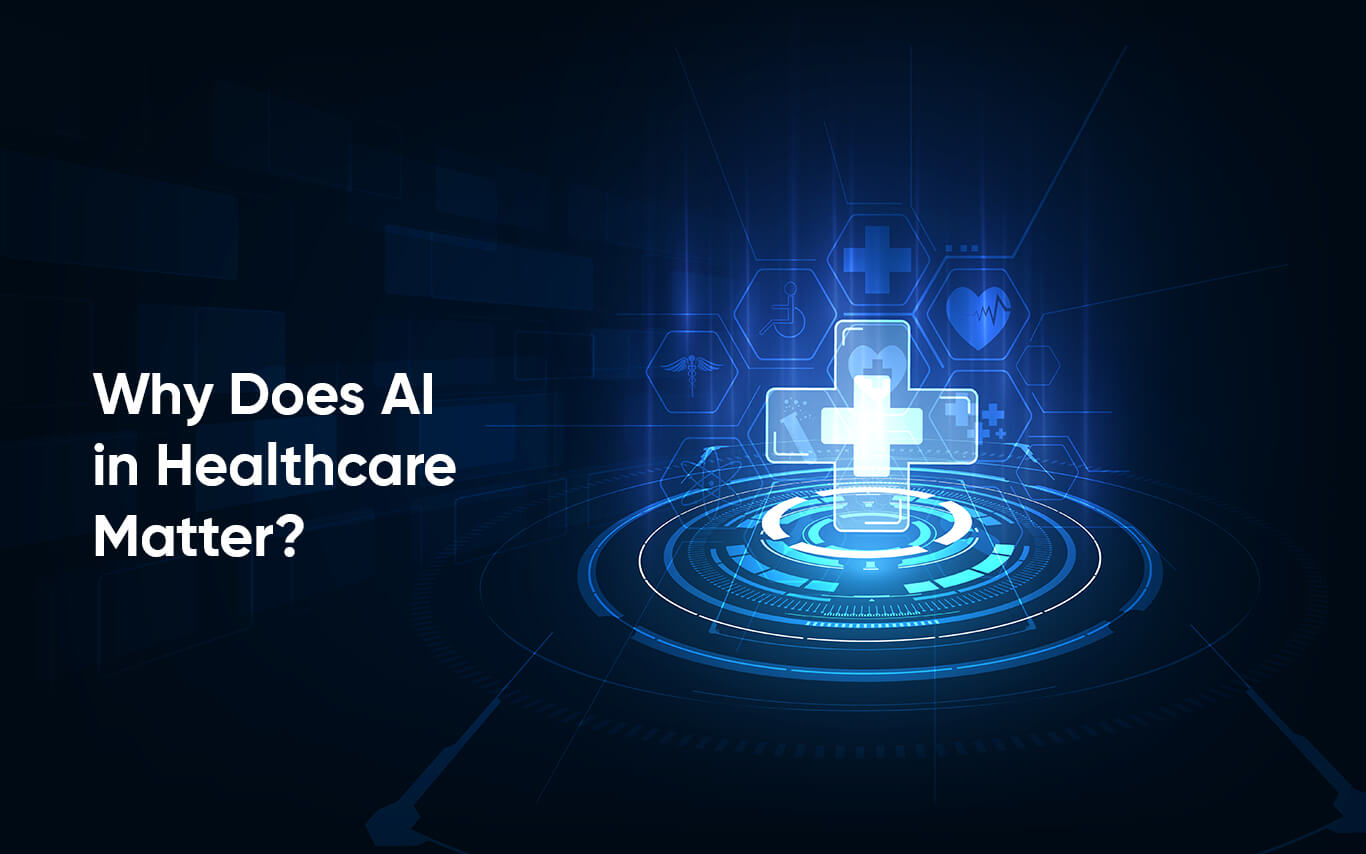How Healthcare Startups Can Benefit From AI?

AI is commonly used as a dramatic antagonist, a formidable enemy, and rarely in a heroic role in science fiction because as far as a sci-fi thriller is concerned it can be fully adapted to the storyline. But how AI can be beneficial for a healthcare start-up? The use of artificial intelligence (AI) in healthcare has the potential to revolutionize the field of medicine. With AI, healthcare systems can provide better care to more people and increase productivity. By reducing burnout, healthcare practitioners can spend more time on direct patient care and improve their experience.
What is AI in healthcare?

Healthcare artificial intelligence is a generic term that describes the use of cognitive technologies and machine learning algorithms to improve health outcomes. A medical diagnosis might be predicted using AI in healthcare by analyzing and acting on medical data.
The rise of artificial intelligence has now captured the attention of healthcare decision-makers, governments, investors, and innovators alike. A growing number of governments are planning to use AI in healthcare, and many are investing heavily in research related to AI. The private sector is still playing a large role in healthcare-related AI, with venture capital funding reaching $8.5 billion. Healthcare startups, pharmaceutical companies, medical device companies, and health insurers are all integrating AI into healthcare.
How Does AI Help Healthcare?

Access to real-time data:
To diagnose and treat medical issues, it is crucial to obtain accurate information in a timely manner. Doctors and other medical professionals can use artificial intelligence to make critical clinical decisions more efficiently and effectively. Increasing the speed and quality of results can reduce waiting times and improve preventative measures. The benefits of access to real-time data can be seen in the improvement of physician-patient relationships. Engaging patients in their treatment can be made easier with the availability of vital patient data via mobile devices. Medics and nurses can receive alerts when their patients' conditions change. The advancement of AI technology has led to the collection of more data than traditional medical institutions could ever hope to amass.
Streamline tasks:
Throughout the world, artificial intelligence has already transformed healthcare practices. Patients' histories can be tracked, appointments scheduled, and clinical details translated. AI can help healthcare startups streamline time-consuming tasks and reduce the need for additional staff. It is possible to schedule appointments, track patients, and recommend care with automated systems. Keeping track of insurance policies is another tedious but critical task that can be simplified with AI. By using AI, insurance claim denial costs can be minimized. Health providers can discover and address mistaken claims with AI before insurance companies deny payment. In addition to streamlining the claims process, AI also saves hospital staff time by allowing them to work through denials more quickly. Essentially, AI allows healthcare startups to access a wide range of patient-beneficial options.
Time and resource utilization:
More and more vital clinical processes are becoming automated, which allows medical professionals to assess patients and diagnose illnesses and ailments more efficiently. AI is helping healthcare establishments save hours of productivity. The use of AI can save massive amounts of money, especially for a healthcare start-up. Several administrative tasks, including filing, reviewing, and resolving accounts, contribute substantially to healthcare costs. It also helps to understand cases that require medical attention. A proper assessment of healthcare necessity requires an extensive review of a patient's history and information. Physicians can use new NLP and deep learning algorithms to study cases and prevent overlooking any patient who might need care. The liberation of vital productivity hours and resources allows medical professionals to devote more time to patient care.
Enables research:
Researchers can collect large amounts of data using AI. As we learn more about deadly diseases, we are able to analyze them more effectively. When it comes to real-time data, research becomes easier with the unlimited sources of information available. For instance, medical bodies such as Children's Cancer Data Lab have developed helpful software to make it easier for medical practitioners to manage large data collections. Furthermore, AI can be used to identify symptoms of an illness early on. Currently, a number of telehealth solutions are being implemented to track patient progress, recover diagnoses, and share population information.
Reduce burnout:
Over half of primary care physicians say deadline pressures and other workplace factors make them stressed. Medical professionals are freed from multitasking by utilizing artificial intelligence to streamline procedures, automate functions, and organize operations. A physician's patient load and the nature of their career contribute a great deal to burnout. But with the help of AI, medical professionals can feel some amount of stress reduction as it assists with the more time-intensive operations like its ability to explain diagnoses, for instance.
What Can Healthcare Startups Do to Maximize the Benefits Of AI?
When evaluating artificial intelligence in healthcare, as a healthcare start-up you may wonder how to gain the most benefit from it. A few essential steps should be followed to ensure that artificial intelligence in healthcare runs smoothly and avoids major pitfalls.
Start with a simple use case:
To reap all the benefits of AI in healthcare, it is essential to ensure that the system is functional and will provide results. Implement AI in your organization by applying it to your most repetitive tasks. This will increase your efficiency and allow you to utilize technology more effectively. Assess which clinical problems need to be addressed before integrating AI tools. Also, determine in what way the tools can improve productivity and the patient experience.
Keep your colleagues and patients informed:
Some healthcare executives may not trust AI solutions. The technology is still relatively new, which explains the skepticism. However, you can allay most concerns by explaining how AI technology works and the economic aspect of it. Make them aware of the potential benefits of these advanced tools. Despite what many people fear, AI won't replace jobs but will enhance working conditions and streamline workflows instead. Provide your patients with the assurance that AI solutions will only supplement doctors' activities while preserving data security.
Trusted technology partner:
It is never an easy task to migrate from one technology to another. An experienced and talented AI service provider like Neetable will ensure a smooth journey for you. The right technology partner can assist you with addressing technological challenges, providing appropriate training for your colleagues, and helping make your AI solution scalable. Their ultimate goal is to competently implement AI and fine-tune processes to ensure efficient results.
Some of the Common Use Cases of AI in Healthcare
Data management for medical records:
A major application of artificial intelligence and digital automation is data management. Data can be accessed faster, more consistently, and stored more efficiently using machine learning (ML).
Treatment plan:
Systems based on artificial intelligence is being developed to help select the appropriate, customized treatment path for each individual.
Creation of drugs:
Drug development can take more than a decade and cost billions of dollars. When the Ebola virus scare was in full swing, a program powered by AI scanned existing medicines to re-design them to create a drug that could fight the disease and resist its spread.
Precision medicine:
Genomic and genetic studies investigate disease mutations and links. The use of AI can allow body scans to spot cancer and vascular diseases early and predict potential health issues based on a person's genetic makeup.
Health Monitoring:
Health trackers such as FitBit and Garmin monitor activity levels and heart rates. Doctors can use this information to gather additional data about the needs and habits of patients.
Why Does AI in Healthcare Matter?

As a fundamental part of a productive, prosperous society, healthcare is one of the most critical sectors of big data. AI can have a profound impact on healthcare data. The use of artificial intelligence (AI) can enhance the productivity of doctors, nurses, and other healthcare workers. Healthcare AI can lead to better patient outcomes, improve care and quality of life, and improve diagnosis and treatment plans. A combination of AI and government data can also predict and track the spread of infectious diseases. Because of this, AI can play a vital role in the fight against various health crises on a global scale.
FAQs
Q. How can AI help the healthcare industry?
A. Artificial intelligence can analyze big data sets, gain insights from patients and contribute to predictive analyses. The healthcare ecosystem can improve patient care by quickly gathering insights from patients. Several modern technologies, such as wearable healthcare technology, also use AI to improve patient care.
Q. What is an example of AI in healthcare?
A. AI-based health trackers have become popular for monitoring people's health and alerting them when unusual or unlikely data is collected. Many wearable devices are available today, including Fitbit and Apple watch.
Request a Quote
Categories
Popular posts
Best Practices for Software Product Engineering Every CTO Should Implement
2023-14-18How to Build Your Own On-Demand Carpooling App Services?
2023-08-25How to Start an On-Demand Fuel Delivery Business: A Comprehensive Guide
2023-07-28Empowering Miners: How Fleet Management Apps are Transforming the Mining Industry?
2023-07-21A Complete Guide to Develop a Food Delivery App for Restaurants in 2023
2023-07-08Mobile Apps Transforming the Travel Industry: A Game-Changer in Travel Planning and Experience
2023-07-07
